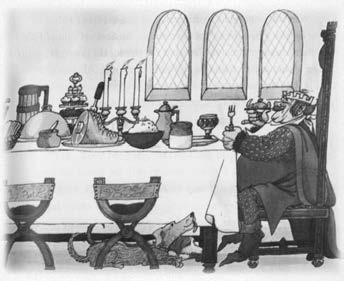
4 minute read
READING 4 FUN
1 Read the name of the story, look at the pictures and say what you think the story is about.
2 Listen and read the story to fi nd out what the ‘dragon soup’ is.
DRAGON SOUP
(after Tom McGowen)
There was a kingdom1 and a king who was very fat because he was fond of food. He began his day with a big breakfast at 8 o’clock and had a snack at 10 and a large lunch at 12. Then he watched tennis or horses, then he had a small snack at 2 in the afternoon. At 4 he had sandwiches and at 7 in the evening he happilly sat down to a royal dinner party. happilly sat down to a royal dinner party.
The king had one problem: he wanted to make changes in every dish. That’s why all his cooks left him because they didn’t like changing all their recipés.
“We are going to have a contest and the one who tells me the most unusual recipé can be the royal cook!” the king said one day.


134
1a kingdom [9kiNd3m] — королівство
Lesson 2

The next day all the people who thought they were good cooks came to the king’s castle. One young man saw that long line of people and learnt about the king’s contest. He learnt about the problem that the cooks had with the king. They didn’t like the king, who told them what to do, put things in their pots and did cooking himself. So, the young man thought a little and got into a line.


In the afternoon he fi nally came inside the palace. “What’s your name and recipé?” the king asked. “I’m Klaus Dinkelspies, Your Majesty1. I’ve got a recipé of a dragon soup!” The king said, “That’s interesting. What’s in it?” “Oh, I can’t tell you!” answered Klaus. “It is a secret in my family.” “I understand,” said the king, “but if we can get a dragon, you must cook it for me. You are the new royal2 cook now.”
Klaus felt good. When the king wanted any dish, Klaus

1Your Majesty [9m2dzCsti] — Ваша Величність 2royal [9rci3l] — королівський
135

136
asked him, “Would Your Majesty tell me exactly1 how you want this dish cooked?” The king was happy not only to give him instructions but to cook happilly in the kitchen. Klaus only kept saying, “Oh, I usually use the same method.” When a dish was ready, he said, “I thank you for all your instructions, sir. Now I can invite you to the dinner party!”

Time passed. One morning the king shouted, “Surprise! Now you can cook your special dragon soup. I am not going to come into the kitchen. I remember it’s your secret!” The soldiers brought the cage2 with the real dragon. Klaus looked at it and saw a tear3 on the dragon’s cheek. “Are you going to kill me?” he asked. “Believe me, dragon,” said Klaus. “I don’t want to cook you. I just wanted to fool the king and show I was a cook. I can’t make any soup.” “Oh, it’s easy,” said dragon. “Can you cook?” asked Klaus. “Well, I’m a good cook,”

1exactly [ig9x2ktli] — точно 2a cage [keidz] — клітка 3a tear [te3] — сльоза


Lesson 2 Lesson 2

answered the dragon and Klaus began to smile…
At 7 in the morning the king came to taste Klaus’s wonderful dragon soup. After four helpings1 he said, “That is one of best soups I’ve ever eaten!” “You see, the thing that makes dragon soup so unusual is that it can only be when a dragon cooks it itself! Let me introduce2 my assistant!” Klaus called and the dragon came in, wearing a tall white cook’s hat and an apron3 .
So, Klaus was happy to live in the beautiful palace without working hard. The dragon felt good to be an assistant of the royal cook. But the happiest of all was the kitchen helper. He didn’t need to light4 fi re because the dragon lighted his own stove5 by shooting fi re out of his nose!
3 Answer the questions.
1 How do you know that the king was fond of eating? 2 What sort of cook did the king need? 3 What did Klaus do to become a royal cook? 4 Did the king like his new cook? Why? 5 Was Klaus a kind and clever man? How do you know? 6 Who was the happiest in the end? Why?
4 Work in a group of four.
a) Divide the story into the passages6 and give the headings to each of them. b) Use your list of headings as a plan to retell the story.
1a helping [9helpiN] — порція 2to introduce [0intr39dju:s] — представляти 3an apron [9eipr3n] — фартух 4to light [lait] — запалювати 5a stove [st3Uv] — піч 6a passage [9p2sidz] — уривок









